七年级英语下册1-3单元复习资料
Units1-3 复习讲义2022-2023学年人教版七年级英语下册

【板块1】Unit 1 Can you play the guitar?1.情态动词+V原 can do例:He can swim.I can dance.We can sing.2.Play+ the+ 西洋乐器play the guitar play the violin球类,棋类(不加)play chess play basketball3. join 参加社团、组织、团体 join the chess club join the English club4. 4个说的区别:say+内容 say hello toSpeak+语言 speak EnglishTalk 谈论 talk about sth talk with sb talk to sbTell 告诉,讲述 tell sb (not)to do sthTell stories/ jokes5. want= would like +(sb)to do sth6. 4个也的区别:too 肯定句末(前面加逗号) I like English, too.Either否定句末(前面加逗号) I don’t like English, either.Also 行前be 后 I also like English.7.be good at+ V-ing擅长于I am good at swimming.be good for 对…有益(be bad for对…有害)Apples is good for our health.be good with和…相处好He is good with old people.8. How/ what about+V-ing …怎么样?(表建议)9. 感官动词(look, sound, taste, smell, feel)+adj/ likelook like例:What does he look like?sounds like例:Sounds like you have fun.10.show sth to sb=show sb sthHe shows our school to his friend.13. help sb (to)do sthHelp sb with sth14. be busy doing sth/ be busy with sth16.need to do sth17. be free= have time18.make friends with19. call sb at +电话号码例:Call me at 1008620.on the weekend= on weekends21. English-speaking students 说英语的学生(带有连词符,有形容词性质)22. do kung fu表演功夫【课堂练习】一、单选:1( )How do you______this in English? A.speak B.say C.tell2( )Do you know a man_____Jack Smith? s d3( )-Do you know the way to the post office?-Yes,Follow me and I’ll______you the way(给你带路)A.callB.showsC.show4( )I can play______guitar,but I can’t play_____Chinese chess.A./,theB.the,aC.the,/5( )Can your father________Chinese?/Yes,she can____Chinese a little.A.speak,speaksB.say ,sayC.speak,speak6( )I need_______a song with you.A.to singB.singingC.sing7( )Tom can’t play the violin_____play chess.A.andB.butC.or8( )Our teacher told us________carefully in class.A.listenB.to listenC.listening9( )I can sing well, I want_______the music club..join B.to join C.joining10( )You sing well,You______a good musician when you grow up.A.maybeB.may beC.may11( )They often help kids________dancing.A.toB.atC.with.12( )I can_______Chinese Kongfu.A.playB.doC.make13( )He tells Jim_______to school on time.A.goB.to goC.goes14( )Victor is good_____singing,,and so he’s good_____the children in the music club.A.at,forB.with,forC.at,with15( )Please call Alan______053-765498.A.at.B.forC.on16( )Jim,can you_______this word in Chinese?/Yes,I can_______a little Chinese.A.speak,sayB.say,speakC.tell,speak17( )Sam can sing English songs________,but I can’t.A.very goodB.very muchC.very well.18( )Let’s______for a walk,shall we?A.to goB.goingC.go二、情景翻译1.你会弹吉他吗?不,我不会。
人教新目标七年级下册1-3单元词组总结背诵(可打印)
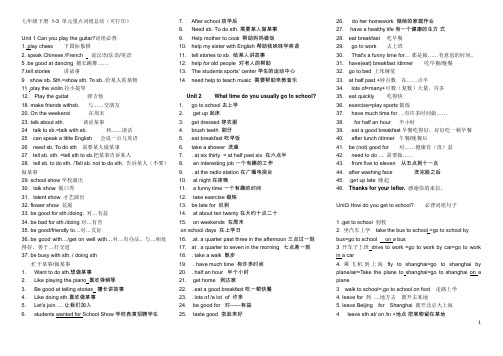
七年级下册1-3 单元重点词组总结(可打印)Unit 1 Can you play the guitar?词组必背1. play chess 下国际象棋2. speak Chinese /French 说汉语/法语/英语5 .be good at dancing 擅长跳舞……7.tell stories 讲故事9 show sb. Sth.=show sth. To sb..给某人看某物11 .play the violin拉小提琴12. Play the guitat 弹吉他18. make friends withsb. 与……交朋友20. On the weekend 在周末23. talk about sth. 谈论某事24 talk to sb.=talk with sb. 和.......谈话25 can speak a little English 会说一点儿英语26 need sb. To do sth 需要某人做某事27 tell sb. sth. =tell sth to sb.把某事告诉某人28. tell sb. to do sth. /Tell sb. not to do sth. 告诉某人(不要)做某事29. school show学校演出30. talk show 脱口秀31. talent show 才艺演出32. flower show 花展33. be good for sth./doing. 对…有益34. be bad for sth./doing对…有害35. be good/friendly to…对…友好36. be good with…/get on well with…对…有办法、与…相处得好、善于…打交道37. be busy with sth. / doing sth.忙于某事/做某事1. Want to do sth.想做某事2. Like playing the piano 喜欢弹钢琴3. Be good at telling stories 擅长讲故事4. Like doing sth.喜欢做某事5. Let’s join .... 让我们加入6. students wanted for School Show学校表演招聘学生7. After school放学后8. Need sb. To do sth. 需要某人做某事9. Help mother to cook 帮助妈妈做饭10. help my sister with English 帮助我妹妹学英语11. tell stories to sb. 给某人讲故事12. help for old people 对老人的帮助13. The students sports’ center学生的运动中心14. need help to teach music 需要帮助来教音乐Unit 2 What time do you usually go to school?1. go to school 去上学2. get up 起床3. get dressed 穿衣服4. brush teeth 刷牙5. eat breakfast 吃早饭6. take a shower 洗澡7. . at six thirty = at half past six 在六点半8. an interesting job 一个有趣的工作9. . at the radio station 在广播电视台10. at night 在夜晚11. a funny time 一个有趣的时间12. take exercise 锻炼13. be late for 迟到14. at about ten twenty 在大约十点二十15. on weekends 在周末on school days 在上学日16. .at. a quarter past three in the afternoon 三点过一刻17. at . a quarter to seven in the morning 七点差一刻18. . take a walk 散步19. . have much time 有许多时间20. . half an hour 半个小时21. get home 到达家22. . eat a good breakfast 吃一顿快餐23. . lots of /a lot of 许多24. be good for 对------有益25. taste good 尝起来好26. do her homework 做她的家庭作业27. have a healthy life 有一个健康的生方式28. eat breakfast 吃早餐29. go to work 去上班30. That's a funny time for…那是做……有意思的时间。
七年级下册英语1到3单元知识归纳

七年级下册英语1到3单元知识归纳Unit 1: My Day。
In this unit, we learned how to talk about daily routines and activities. We learned how to use simple present tense to describe what we do every day. For example, "I get up at 7 o'clock in the morning." We also learned how to ask and answer questions about daily routines using the question words "what", "when", and "where". It's important to remember to use the correct word order when forming questions and answers.Unit 2: My School。
In Unit 2, we talked about school subjects, classrooms, and school activities. We learned how to talk about our favorite subjects and teachers. We also learned how to describe our school facilities and the things we do at school. For example, "I have English class on Monday and Wednesday." We practiced using prepositions of place to talk about where things are located in the school, such as "the library is next to the cafeteria".Unit 3: My Family。
人教版英语七年级下册Unit 1-3中考总复习 知识点总结+首字母练习+语法填空
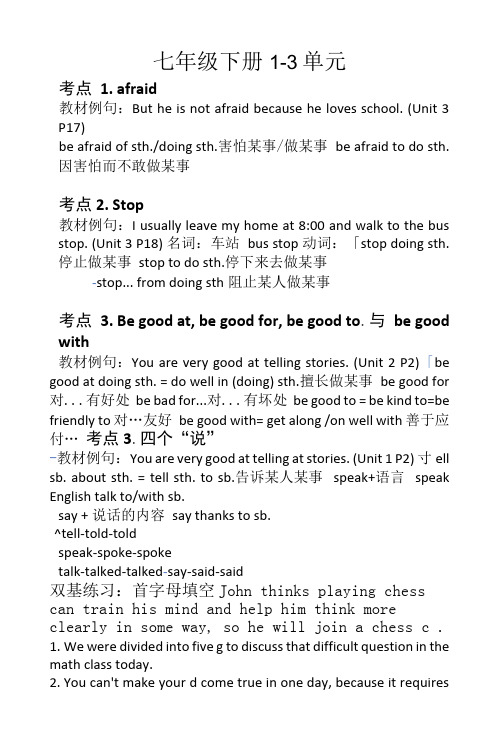
七年级下册1-3单元考点 1. afraid教材例句:But he is not afraid because he loves school. (Unit 3 P17)be afraid of sth./doing sth.害怕某事/做某事be afraid to do sth.因害怕而不敢做某事考点2. Stop教材例句:I usually leave my home at 8:00 and walk to the bus stop. (Unit 3 P18) 名词:车站bus stop动词:「stop doing sth.停止做某事stop to do sth.停下来去做某事-stop... from doing sth阻止某人做某事考点 3. Be good at, be good for, be good to.与be good with教材例句:You are very good at telling stories. (Unit 2 P2)「be good at doing sth. = do well in (doing) sth.擅长做某事be good for 对...有好处be bad for...对...有坏处be good to = be kind to=be friendly to 对…友好be good with= get along /on well with 善于应付… 考点3.四个“说”-教材例句:You are very good at telling at stories. (Unit 1 P2) 寸ell sb. about sth. = tell sth. to sb.告诉某人某事speak+语言speak English talk to/with sb.say + 说话的内容say thanks to sb.^tell-told-toldspeak-spoke-spoketalk-talked-talked-say-said-said双基练习:首字母填空John thinks playing chess can train his mind and help him think more clearly in some way, so he will join a chess c .1.We were divided into five g to discuss that difficult question in the math class today.2.You can't make your d come true in one day, because it requiresefforts.3.In many countries around the world, street food is popular with not only local people but a outsiders.4.In the evening, I e watch cartoons or play computer games.5.My father used to go to work b bus, but now he rode a bike instead in order to keep fit.6.When you feel stressed, you can watch some h programsto relax yourself.7.Mary, together with her parents, I near the sea.8.The two words sound similar, but I still find some differences b them.9.You can choose to finish your homework at school, o you can do it at home.巩固提高:语法填空How can you team up with some strangers to complete tasks in a short time? Thafs a question Judy had never thought about before,1. after this five-day summer camp, she thinks she has found the answer to it.This past summer, Judy took part in the SSP Mars, Mission Workshop with 30 students who came 2. different schools across Shanghai. They were divided into different 3.(group) and given the task of designing a plan for traveling to Mars. There were a few problems. The first one was how to 4.(quick)getalongwithothers.Everyone introduced 5. (they) at first. It was helpful to know each other. They worked as a team, which helped them work much better. Next, they had to learn to make compromises (妥协、). “We have a lot of discussions every day. Sometimes we 6.(agree) with what others say. We would then reconsider all the ideas and choose 7. right one." Judy said.On the last day, they needed to complete a team report. After 8. (work) with each other for five days, they solved all the problems easily.“It 9. (be)a wonderful experience to work together towards a common goal/ She said. Judy is now looking forward to the nextchance 10. (join)a summer camp.。
人教版初中英语七年级下册中考总复习:Units1-3七年级下册教材考点梳理整合+单元练习(含答案)

第四讲七年级下册Units 1-3 教材梳理整合基础知识梳理【话题】Unit 1: joining a club Unit 2: Daily routinesUnit 3: Transportation【词汇总结】名词:1.story __________ (复数)2.brush _________(复数)3.tooth __________ (复数)______________ (刷牙)4.life ___________(复数)_____________拯救/丢掉某人的生命___________________ (过着....的生活)5.village __________ (n.)村民6.dish ________ (复数)___________ 洗碗________________主菜7.centre ___________ (adj.)中心的8.half ___________(复数)动词:9.sing ________(过去式)_________ (过去分词)_________(n.)歌手10.swim ________ (过去式)________(过去分词)________(n.)游泳者11.dance _________(n.)跳舞者12.draw __________(过去式)_________ (过去分词)13.tell __________(过去式)___________(过去分词)_________(现在分词)____________讲故事________________讲故事俱乐部14.write __________(过去式)_________ (过去分词)__________(n.)作家15.teach __________(过去式)_________(过去分词)__________ (n.)老师______________ 教某人做某事______________给某人一个教训16.run ___________(过去式)________(过去分词)__________ (现在分词)_________ (n.)跑步者17.clean __________ (n.)清洁工18.ride ___________(过去式)________ (过去分词)19.drive _________(过去式)___________ (过去分词)________(n. )司机_____________逼疯某人__________________驾照20.leave ___________(过去式)__________ (过去分词)___________ 把某物落在某地_______________留言21.bring_________(过去式)________(过去分词)__________使显现22.cross __________(prep.)__________(n.)十字路口23.relax _______(adj.)放松的_________(adj.)令人放松的24.like __________(反义词)______________看起来像_______________听起来像形容词:25.fun________(adj.) _________(比较级)____________(最高级)26.quick __________(adv.)27.true___________(n.) ___________(adv.)28.quiet ________(adv.)29.many ________(比较级)_________(最高级)30.good /well ________(比较级)_________(最高级)31.far _________(比较级)_________(最高级)【短语归纳】动词短语1.下国际象棋_____________________2.说英语_________________________3.弹吉他/钢琴____________________4.从事___________________________5.拉小提琴_______________________6.敲鼓___________________________7.交朋友________________________8.在某方面帮助某人_______________9.加入俱乐部_____________________10.起床___________________________11.穿上衣服_______________________12.吃早餐________________________13.洗淋浴__________________________14.去上学_________________________15.做作业__________________________16.上床睡觉________________________17.散步__________________________18.做运动_________________________19.乘地铁_________________________20.骑自行车_______________________21.步行去上学_____________________22.实现;变成现实_________________23.做早饭___________________________24.想起;认为______________________25.铺床_____________________________26.去上班_________________________27.思考;思索___________________介词短语28.在周末________________________29.在上学日的晚上_______________________30.骑自行车__________________________形容词短语31.擅长___________________________32.善于应付.....的;对...有办法___________________33.大量的;许多________________________34.对....有益/有好处___________________________【句子提炼】人物活动1, 你擅长讲故事,你可以加入讲故事俱乐部。
人教版英语七年级下册 Unit 1 ---unit3重难点 归纳
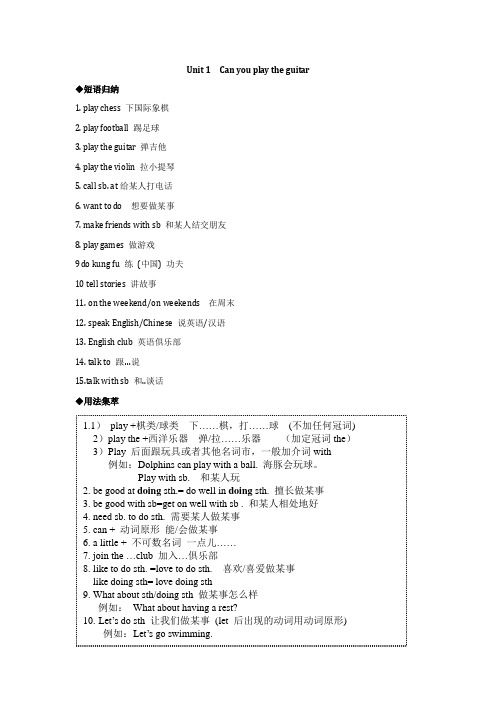
Unit 1 Can you play the guitar◆短语归纳1. play chess 下国际象棋2. play football 踢足球3. play the guitar 弹吉他4. play the violin 拉小提琴5. call sb. at给某人打电话6. want to do 想要做某事7. make friends with sb 和某人结交朋友8. play games 做游戏9 d o kung fu 练(中国) 功夫10 tell stories 讲故事11. on the weekend/on weekends 在周末12. speak English/Chinese 说英语/汉语13. English club 英语俱乐部14. talk to 跟…说15.talk with sb 和..谈话◆用法集萃1.1)play +棋类/球类下……棋,打……球(不加任何冠词)2)play the +西洋乐器弹/拉……乐器(加定冠词the)3)Play 后面跟玩具或者其他名词市,一般加介词with 例如:Dolphins can play with a ball. 海豚会玩球。
Play with sb. 和某人玩2. be good at doing sth.= do well in doing sth. 擅长做某事3. be good with sb=get on well with sb . 和某人相处地好4. need sb. to do sth. 需要某人做某事5. can + 动词原形能/会做某事6. a little + 不可数名词一点儿……7. join the …club 加入…俱乐部8. like to do sth. =love to do sth. 喜欢/喜爱做某事like doing sth= love doing sth9. What about sth/doing sth 做某事怎么样例如:What about having a rest?10.Let’s do sth 让我们做某事(let 后出现的动词用动词原形)例如:Let’s go swimming.◆重难点注释一.Can 的用法1. 表示能力She can sing that song in English. 她能用英文唱那首歌。
中考英语人教版复习七年级下册Unit1-3知识整理

一、单词默写。
1.吉他2.钢琴3.小提琴4.鼓5.游泳6.唱歌7.说(语言)8.告诉,讲述9.交谈10.跳舞11.画画12.象棋13.加入14.俱乐部15.写作16.展示;节目17.或者;否则18.也(句中)19.人们20.家21.制造22.今天23.中心24.周末25.教26.音乐家27.穿衣服;连衣裙28.刷29.牙齿(复数)30.淋浴31.通常32.从不33.四十34.早的(地)35.工作(职业)36.工作(任务)37.车站;站台38.夜晚39.滑稽的40.锻炼41.最好的42.组;群43.一半44.过(时间),过去的45.四分之一;一刻钟46.家庭作业47.跑步48.打扫;干净的49.散步,步行50.快速地51.或者;也52.有时53.尝起来;味道54.生命;生活55.火车56.地铁57.公交车58.自行车59.五十60.八十61.百62.分钟63.远的64.千米65.新的66.每一;每个67.开车68.骑车69.居住70.停止71.通过(物体表面)72.许多73.河流74.在…之间75.桥76.年;岁77.害怕的;恐惧的78.喜欢;像79.离开;留下;遗忘80.梦想81.真的;符合事实的二、重点短语。
1.弹吉他/钢琴2.打鼓3.拉小提琴4.下国际象棋5.和…交谈6.擅长做某事7.向某人展示某物8.讲故事/笑话9.游泳俱乐部10.讲故事俱乐部11.运动俱乐部12.呆在家13.善于应付某人14.和某人交朋友15.帮助某人做某事16.在周末17.告诉某人(不)做某事18.谈论某事19.教某人做某事20.起床21.穿衣22.刷牙23.洗澡24.休息25.放学26.回家27.做作业28.去睡觉29.散步30.快速吃早餐31.要么…要么32.既不…也不33.许多34.过好的生活35.到达36.乘火车/地铁/公交/飞机…37.骑自行车38.开车39.多远40.多久41.步行;走路42.走路15分钟43.每天44.过河45.在…和…之间46.害怕…/做某事47.实现48.一个穿红衣服的男孩49.过索道三、单项选择。
(完整版)七年级英语(下册)1_3单元复习资料全
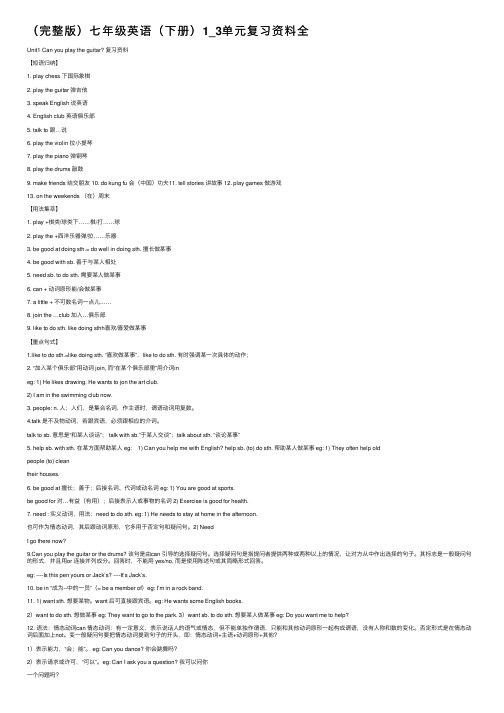
(完整版)七年级英语(下册)1_3单元复习资料全Unit1 Can you play the guitar? 复习资料【短语归纳】1. play chess 下国际象棋2. play the guitar 弹吉他3. speak English 说英语4. English club 英语俱乐部5. talk to 跟…说6. play the violin 拉⼩提琴7. play the piano 弹钢琴8. play the drums 敲⿎9. make friends 结交朋友 10. do kung fu 会(中国)功夫11. tell stories 讲故事 12. play games 做游戏13. on the weekends (在)周末【⽤法集萃】1. play +棋类/球类下……棋/打……球2. play the +西洋乐器弹/拉……乐器3. be good at doing sth.= do well in doing sth. 擅长做某事4. be good with sb. 善于与某⼈相处5. need sb. to do sth. 需要某⼈做某事6. can + 动词原形能/会做某事7. a little + 不可数名词⼀点⼉……8. join the …club 加⼊…俱乐部9. like to do sth. like doing sthh喜欢/喜爱做某事【重点句式】1.like to do sth.=like doing sth. “喜欢做某事”,like to do sth. 有时强调某⼀次具体的动作;2. “加⼊某个俱乐部”⽤动词 join, ⽽“在某个俱乐部⾥”⽤介词ineg: 1) He likes drawing. He wants to jon the art club.2) I am in the swimming club now.3. people: n. ⼈;⼈们,是集合名词,作主语时,谓语动词⽤复数。
人教版七年级英语下册1--3单元知识点总结

人教版七年级英语下册1--3单元知识点总结第一单元Can you play the guitar重点短语1. play chess 下国际象棋2. play the guitar 弹吉他3. speak English 说英语4. English club 英语俱乐部5. talk to 跟…说6. play the violin 拉小提琴7. play the piano 弹钢琴8. play the drums 敲鼓9. make friends 结交朋友10. do kung fu 练(中国) 功夫11. tell stories 讲故事12. play games 做游戏13. on the weekend/on weekends 在周末重点语法1.can+动词原形,它不随主语和数而变化。
(1)含有can的肯定句:主语+can+谓语动词的原形+其他。
如:I can play the piano.(2)变一般疑问句时,把can提前:Can+主语+动词原形+其他?如:Can you paly the piano?肯定回答:Yes,主语+can。
否定回答:No,主语+can‘t. 如:Yes,I can. / No I can’t.(3)含有can的否定句:主语+can't+动词的原形+其他。
如:I can’t play the piano(4)含有can的特殊疑问句:特殊疑问词+can+主语+动词原形+其他?如:What can you do?/ What can he do?2. Talk , tell ,say , speak 的区别(1)Speak“说”或“讲”不强调说话内容.用作不及物动词时,侧重指说话的动作而非内容,可指长篇演讲或三言两语的交谈,也可指简单的开口说话的能力;用作及物动词时,其宾语常为某种语言。
speak to sb. 同某人说话speak Chinese说汉语吗(2)Talk谈论某事, 强调双方“交谈”和speak 一样,强调说话的动作而非内容talk about / to / with和某人谈论某事(3)Say“说出”“说过”侧重内容。
七年级下册英语unit1 3知识点总结
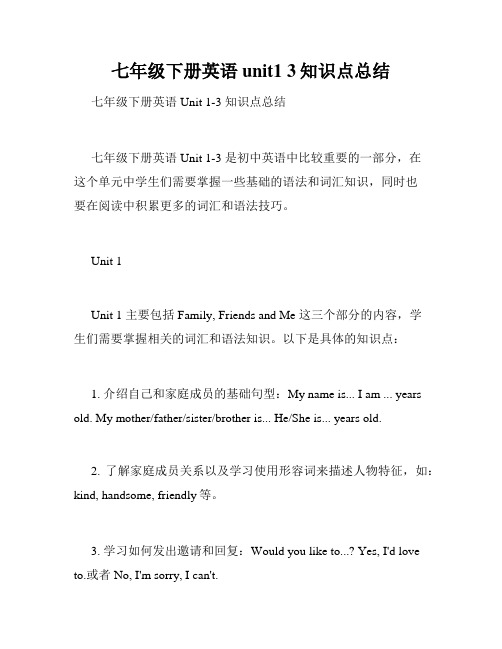
七年级下册英语unit1 3知识点总结七年级下册英语Unit 1-3 知识点总结七年级下册英语Unit 1-3 是初中英语中比较重要的一部分,在这个单元中学生们需要掌握一些基础的语法和词汇知识,同时也要在阅读中积累更多的词汇和语法技巧。
Unit 1Unit 1 主要包括 Family, Friends and Me 这三个部分的内容,学生们需要掌握相关的词汇和语法知识。
以下是具体的知识点:1. 介绍自己和家庭成员的基础句型:My name is... I am ... years old. My mother/father/sister/brother is... He/She is... years old.2. 了解家庭成员关系以及学习使用形容词来描述人物特征,如:kind, handsome, friendly等。
3. 学习如何发出邀请和回复:Would you like to...? Yes, I'd love to.或者 No, I'm sorry, I can't.4. 了解并运用表示年龄、职业、爱好等的英文词汇。
5. 学习关于家庭聚会的词汇,如:food, drinks, games等。
Unit 2Unit 2 的主要内容是学生们需要掌握动词的适当时态和形式,同时加强对英文的听力和口语能力。
以下是具体的知识点:1. 学习动词的时态和形式:现在时、过去时、将来时,以及不规则动词的过去式。
同时进行语句的变换练习。
2. 掌握含时间状语从句的句子结构及用法。
3. 学习如何描述旅行:如何预订机票、酒店,如何问路以及询问如何抵达目的地等相关词汇。
4. 学习寒假和暑假的词汇及表达方式。
5. 加强听力和口语训练,特别是学习如何用英文描写某个地方、描述周围环境等。
Unit 3Unit 3 的主要内容是学习词汇和语法知识。
学生们需要通过阅读和书写来掌握一些实用的英文表达方式。
以下是具体的知识点:1. 掌握名词、形容词和副词的相互转换,如:lively, quiet,noisy等。
+Unit1--+3+单元复习 人教版七年级英语下册

人教版七年级下册Unit1-- 3 单元复习一、用所给单词的适当形式填空。
1. When do you brush your ________ (tooth)?2. Uncle Wang often ________ (go) to work by subway.3.It’s about ten ___________(kilometer)from my home to school.4.Forty and fifty is ________(nine).5. Let me ______( look) at your map.二、单项选择1.Can you help me ________ my English?A.with B.ofC.learning D.about2.Can you paint?________.A.Yes, a little B.Yes, littleC.No, a little D.No, little3.We want two good________ our rock band.A.music for B.musician inC.music in D.musicians for4.—Can John swim? — _________. But he can dance. A.Yes, he can B.No, he doesn’tC.Yes, he do D.No, he can’t5.I want to be a ________ like Lang Lang.A.musician B.teacher C.doctor D.driver6.- ________ do you usually go to school?-At seven o'clock.A. What timeB. WhoC. HowD. Why7.It takes me twenty minutes my homework.A.to doB.doC.doingD.in doing8.How about going there bike?A.inB.onC.atD.by9.It ______ about two hours to get to the top of the mountain from the foot of the mountain.A. takeB. takesC. getD. gets10.—How long does it take? —_____takes about 25 minutes to walk and 10 minutes by bus.A.ThatB.ThisC.ItD.Its11. My brother often takes the train school?to B. at C. by D. of12. —How long does it ________ them to finish the work? —About three hours.A.get B.take C.need D.make 13.How long it to get to his home?A.do; takeB. do ; take sC. does; takeD. does ; takes14.-How do you school?-I take the train.A. getB.get toC. arriveD.arrive to15.How ______ is it _______ your school to the Children’s Palace?A. long, toB. for, toC. long, fromD. far, from三、根据汉语意思完成句子1.我姐姐教我游泳。
七年级下册英语第一单元到第三单元知识点
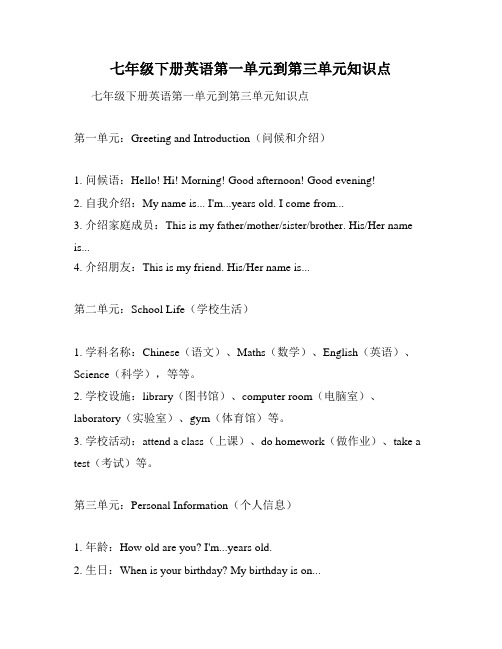
七年级下册英语第一单元到第三单元知识点七年级下册英语第一单元到第三单元知识点第一单元:Greeting and Introduction(问候和介绍)1. 问候语:Hello! Hi! Morning! Good afternoon! Good evening!2. 自我介绍:My name is... I'm...years old. I come from...3. 介绍家庭成员:This is my father/mother/sister/brother. His/Her name is...4. 介绍朋友:This is my friend. His/Her name is...第二单元:School Life(学校生活)1. 学科名称:Chinese(语文)、Maths(数学)、English(英语)、Science(科学),等等。
2. 学校设施:library(图书馆)、computer room(电脑室)、laboratory(实验室)、gym(体育馆)等。
3. 学校活动:attend a class(上课)、do homework(做作业)、take a test(考试)等。
第三单元:Personal Information(个人信息)1. 年龄:How old are you? I'm...years old.2. 生日:When is your birthday? My birthday is on...3. 地址:What's your address? My address is...4. 电话号码:What's your telephone number? My telephone number is...5. 兴趣爱好:What's your hobby? My hobby is...七年级下册英语第一单元到第三单元知识点汇总在七年级下册的英语学习中,我们学到了许多基础的知识点,包括问候和介绍、学校生活以及个人信息。
七下英语Unit1-3知识点大全
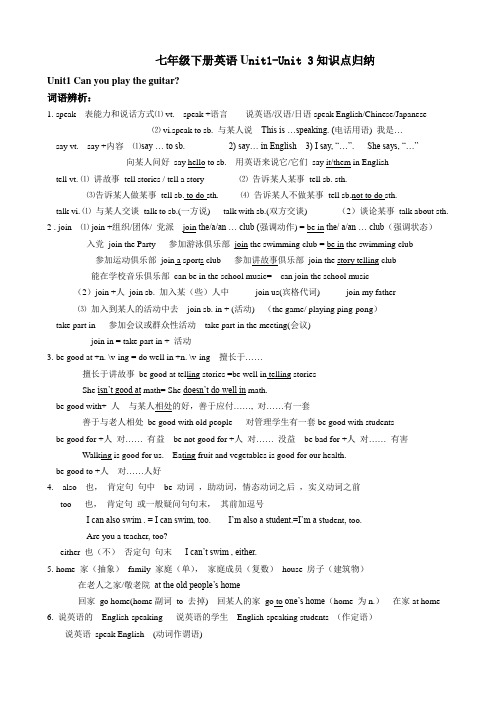
七年级下册英语U nit1-Unit 3知识点归纳Unit1 Can you play the guitar?词语辨析:1. speak 表能力和说话方式⑴ vt. speak +语言说英语/汉语/日语speak English/Chinese/Japanese⑵ vi.speak to sb. 与某人说This is …speaking. (电话用语) 我是…say vt. say +内容⑴say … to sb. 2) say… in English 3) I say, “…”. She says, “…”向某人问好say hello to sb. 用英语来说它/它们say it/them in Englishtell vt. ⑴讲故事tell stories / tell a story ⑵告诉某人某事tell sb. sth.⑶告诉某人做某事tell sb. to do sth. ⑷告诉某人不做某事tell sb.not to do sth.talk vi. ⑴与某人交谈talk to sb.(一方说) talk with sb.(双方交谈) (2)谈论某事talk about sth.2 . join ⑴ join +组织/团体/ 党派join the/a/an … club (强调动作) = be in the/ a/an … club(强调状态)入党join the Party 参加游泳俱乐部join the swimming club = be in the swimming club参加运动俱乐部join a sports club 参加讲故事俱乐部join the story telling club能在学校音乐俱乐部can be in the school music= can join the school music(2)join +人join sb. 加入某(些)人中join us(宾格代词) join my father⑶加入到某人的活动中去join sb. in + (活动) (the game/ playing ping-pong)take part in 参加会议或群众性活动take part in the meeting(会议)join in = take part in + 活动3. be good at +n. \v-ing = do well in +n. \v-ing 擅长于……擅长于讲故事be good at telling stories =be well in telling storiesShe isn’t good at math= She doesn’t do well in math.be good with+ 人与某人相处的好,善于应付……, 对……有一套善于与老人相处be good with old people 对管理学生有一套be good with studentsbe good for +人对…… 有益be not good for +人对…… 没益be bad for +人对…… 有害Walking is good for us. Eating fruit and vegetables is good for our health.be good to +人对……人好4. also 也,肯定句句中be 动词,助动词,情态动词之后,实义动词之前too 也,肯定句或一般疑问句句末,其前加逗号I can also swim . = I can swim, too. I’m also a student.=I’m a st udent, too.Are you a teacher, too?either 也(不)否定句句末I can’t swim , either.5. home 家(抽象)family 家庭(单),家庭成员(复数)house 房子(建筑物)在老人之家/敬老院at the old people’s home回家go home(home副词to 去掉) 回某人的家go to one’s home(home 为n.)在家at home 6. 说英语的English-speaking 说英语的学生English-speaking students (作定语)说英语speak English (动词作谓语)词汇的用法:1.play ⑴play the +乐器弹吉他/弹钢琴/拉小提琴/敲鼓play the guitar/ play the piano/ play the violin/play the drums⑵play + 棋/牌/球类下棋/打牌play chess/play cards踢足球/打篮球/打网球/打排球play soccer/ football/ play basketball/ play tennis/play volleyball⑶与某人玩play with sb. (宾代) 与人玩游戏play games with people玩某物play with sth. 玩水play with water做运动play sports=do/have sports= take exercise 玩电脑游戏play computer games2. sport 作定语常用复数 a sports club sports shoes/trousers/clothes指一项运动用单数Running is a good sport.3. want vt. ⑴ want +n.\to do 1) want sth. 2) want to do 3) want sb. (宾代) to do动词、介词后用宾格代词(me/us/you/you/it/ him/her/them)(2)want …for … 为…… 想要……⑶wanted “被需要的”常用在招聘或启示的标语中招聘教师teachers wanted (作后置定语)want students for school show= students wanted for school show 为学校演出招募学生4.show ⑴ n. 演出,节目,表演,展示学校演出the school show 电视节目TV show 脱口秀talk show 时装表演fashion show 在展览中be on show注意:表演中国功夫do Chinese kung fu⑵ v. 展示,给……看show sb. 给我们展示show us把某物拿给某人看show sb sth. =show sth. to sb. 当看的物为代词时,只能用show it/ them to sb.5. teach 三单teaches v. 教teacher n. 教师⑴ teach sb./sth. teach us/me teach math⑵ teach sb. sth. sb.为宾格代词教我们的英语teach us English⑶ teach sb. to do sth. 教他们游泳teach them to swim6. help v. 帮助⑴ help sb. ⑵ help with sth./v-ing ⑶ help sb. with sth.= help sb. (to) do sth.help me with math=help me learn math=help me to learn mathn. (不可数名词)帮助⑴ some/much help ⑵with one’s help = with the help of 在某人的帮助下⑶ ask sb. for help向某人寻求帮助注意:help yourself to … (some fish.) 随便吃……鱼7. need 实义动词三单needs 有人称和数的变化问句和否定句借助do/does 可单独作谓语⑴ need(s) sth. ⑵ need(s) to do ⑶ need(s) sb/sth. to do情态动词没有人称和数的变化(常用在问句和否定句中)问句need 提前否定句need +not =needn’t 不能单独作谓语need(原形) + v(原形)She need come. (一般)Need she come tomorrow? No, you needn’t8. write ⑴写小说write stories /write a story ⑵写信write a letter⑶给某人写信write to sb.=write a letter to sb.9. or 或者,还是⑴选择疑问句回答不用yes/no 从中选一个来回答or 前读↗,or 后读↘选择疑问句前半部分可以是一般疑问句,也可以是特殊疑问句。
七年级下册Unit 1—Unit 3重点知识复习
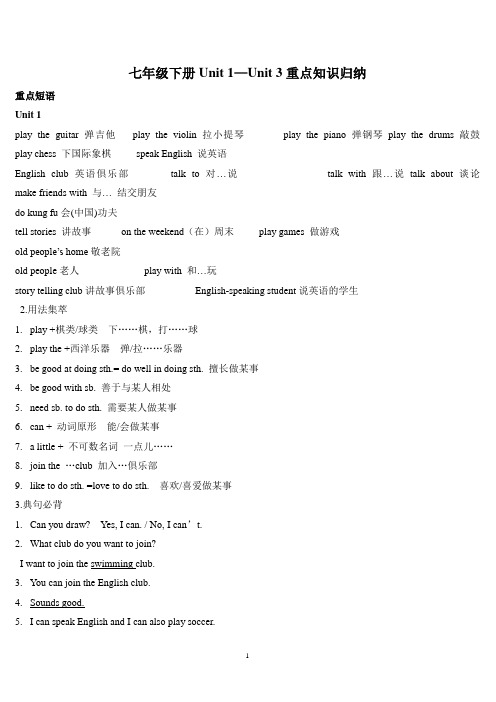
七年级下册Unit 1—Unit 3重点知识归纳重点短语Unit 1play the guitar 弹吉他play the violin 拉小提琴play the piano 弹钢琴play the drums 敲鼓play chess 下国际象棋speak English 说英语English club 英语俱乐部talk to 对…说talk with 跟…说talk about谈论make friends with 与…结交朋友do kung fu会(中国)功夫tell stories 讲故事on the weekend(在)周末play games 做游戏old people’s home敬老院old people老人play with 和…玩story telling club讲故事俱乐部English-speaking student说英语的学生2.用法集萃1.play +棋类/球类下……棋,打……球2.play the +西洋乐器弹/拉……乐器3.be good at doing sth.= do well in doing sth. 擅长做某事4.be good with sb. 善于与某人相处5.need sb. to do sth. 需要某人做某事6.can + 动词原形能/会做某事7. a little + 不可数名词一点儿……8.join the …club 加入…俱乐部9.like to do sth. =love to do sth. 喜欢/喜爱做某事3.典句必背1.Can you draw? Yes, I can. / No, I can’t.2.What club do you want to join?I want to join the swimming club.3.You can join the English club.4.Sounds good.5.I can speak English and I can also play soccer.6.Please call Mrs. Miller at 555-3721.一.短语荟萃1.speak English /Chinese 讲英语/ 讲汉语2 pay the guitar/the drums/the piano /violin 弹吉他3.play chess/soccer/volleyball 下棋,,踢足球4.join the swimming club 加入游泳俱乐部join the art club 加入艺术俱乐部join the chess club 加入象棋俱乐部join the music club 加入音乐俱乐部join a sports club 加入一个运动俱乐部join the story telling club加入讲故事俱乐部5.be good at doing sth. =do well in doing擅长干某事6.tell sb. stories= tell stories to sb. 给某人讲故事,write stories写故事7.talk to sb.与某人说话talk with sb. 与某人交谈talk about 谈论…..8.do Chinese Kung fu 表演中国功夫9.show sb.sth= show sth to sb. 给某人出示事某物10.help sb. with (doing )sth./ ,help sb. (to )do sth.. 帮助某人干某事11.be good with sb. 善待某人12.need sb to do sth. 需要某人干某事13.English-speaking country 讲英语的国家14.call sb. at….给某人打电话15.the Students’Sports Center 学生运动中心16.make friends with sb.与某人交朋友17. at the old people’s home 在老年之家18.be free 有空be busy 繁忙重点句型1、I can play soccer, and I can play the guitar.(play +棋类/球类“下…棋,打…球” play the +乐器“弹/拉…乐器”)2.You’re good at telling stories. Are you good with old people?(be good at sth/doing sth.= do well in sth/doing sth. 擅长做某事)(be good with sb/sth. 善于与某人相处/善于处理某事) (be good for对…有好处)3、Can y ou draw? Yes, I can. / No, I can’t. (can+ do sth / can’t + do sth)4、What club do you want to join? I want to join the chess club.(want sb to do sth想要某人做某事)5、You can join the English club.6、I can speak English and I can also play soccer.7、Are you busy after school?(be busy doing sth忙于做某事)8、We need you to help with sports for English-speaking students.(need sb to do sth需要某人做某事)(help sb to do sth;help sb with sth帮助某人做某事)9、Please call Mrs. Miller at 555-3721. (call sb at + 电话号码)10、I like to draw,too. (like to do sth; like doing sth喜欢做某事)Unit 2what time 几点go to school 去上学get up 起床take a shower 洗淋brush teeth 刷牙get dressed 穿上衣服eat breakfast 吃早饭eat lunch 吃中饭eat dinner 吃晚饭get to 到达go to work 去上班play sports做运动go home 回家do homework 做家庭作业get home 到家take a walk 散步go to bed 上床睡觉clean my room打扫房after that在那之后after school放学后best friend最好的朋友either…or… 要么…要么…(就近原则)lots of=a lot of 许多,大量radio station 广播电台be/arrive late for 迟到at night 在晚上watch TV看电healthy habits健康的习惯healthy life健康的生活after dinner晚饭后play computer games玩电脑游戏half an hour半小时make breakfast做早餐短语归纳1.what time 几点2.go to school 去上学3.get up 起床4.take a shower 洗淋浴5.brush teeth 刷牙6.get to 到达7.do homework 做家庭作业8.go to work 去上班9.go home 回家10.eat breakfast 吃早饭11.get dressed 穿上衣服12.get home 到家13.either…or…要么…要么…(就近原则)14.go to bed 上床睡觉15.take a walk 散步16.in the morning/ afternoon/ evening 在上午/下午/晚上17.lots of=a lot of 许多,大量18.radio station 广播电台19.at night 在晚上20.be/arrive late for 迟到用法集萃1.at + 具体时间点在几点(几分)2.eat breakfast/ lunch/dinner吃早饭/午饭/晚饭3.take a(n) +名词从事(……)活动4.half past +基数词……点半5. a quarter to +基数词差一刻到……点6.from …to …从……到……7.need to do sth 需要做某事典句必背1.What time do you usually get up?I usually get up at six thirty.They usually eat dinner at a quarter to seven in the evening.He usually get up at half past six in the morning.(at+具体时间点“在几点钟”)(at+时钟+分钟“在几点钟”)(half past+时钟(基数词) “…点半” ;a quarter to+时钟(基数词) “差一刻到…点” )(分钟+past+时钟(基数词) “…点过…分”;分钟+to+时钟(基数词) “…点差…分” )2、That’s a funny time for breakfast.3、When do students uasually eat dinner?4、In the evening, I either watch TV or play computer games. (either…or… )5、At twelve,she eats lots of fruit and vegetables for lunch.(lots of+ 可数名词复数/不可数名词“许多,大量…”)6、She knows it’s not good for her, but it tastes good. (be good for)7、Here are your clothes.佳作赏析主题:谈论日常作息习惯写作思路:按照时间顺序记叙一个人的日常作息习惯,必须注意时间的先后顺序,以及时间的表达方式,可以适当运用一些表示频率的副词。
七年级英语下册1-3单元复习

还有必要留在这儿吗?—Yes, you must .是的。
—No. you needn’t /don’t have to.不,你不必。
(2).need还可以作实义动词,此时有人称、数和时态的变化,如果是人作主语后边多接动词不定式。
如:I need to do it right now.我需要马上做这件事。
如果是物作主语,一般用need doing与need to be done这种情况下应注意两点:①.主动形式的动名词doing具有被动的含义;②.该动名词可以改为其动词不定式的被动形式而句子的意义不变。
例如:. The door needs painting. = The door needs to be painted.那扇门需要油漆一下。
Your car _____________ = Your car needs _____________.你的车需要修理了。
6. dare的用法:dare意为“敢、敢于”,用法近似于need,有两种词性:(1)dare作为情态动词,多用于否定句、疑问句或条件句中,无单三形式,只有一般现在时和一般过去时。
I daren’t ask her – will you do it for me?我可不敢问她,你能帮我问问吗?(2)dare作为实义动词,此时有人称、数及时态的变化。
Dare to do sth.敢于做某事如:He doesn’t dare to break his promise.他不敢食言。
7. shall的用法:shall表示征求对方意见(多用于第一、三人称),如:Shall we go out for a walk?我们出去散步好吗?8. should的用法:(1).should意为“应该”,可表示劝告、建议、义务、责任等。
如:We should protect the environment.我们应该保护环境。
(2)Should have done表示对过去动作的责备、批评。
英语七年级下册1-3单元知识点
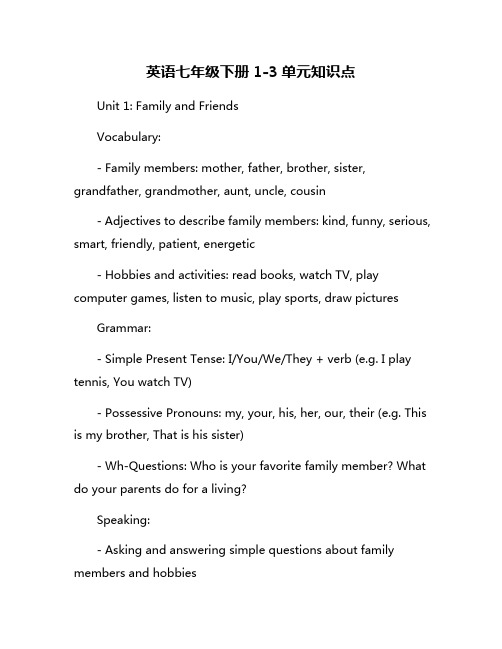
英语七年级下册1-3单元知识点Unit 1: Family and FriendsVocabulary:- Family members: mother, father, brother, sister, grandfather, grandmother, aunt, uncle, cousin- Adjectives to describe family members: kind, funny, serious, smart, friendly, patient, energetic- Hobbies and activities: read books, watch TV, play computer games, listen to music, play sports, draw picturesGrammar:- Simple Present Tense: I/You/We/They + verb (e.g. I play tennis, You watch TV)- Possessive Pronouns: my, your, his, her, our, their (e.g. This is my brother, That is his sister)- Wh-Questions: Who is your favorite family member? What do your parents do for a living?Speaking:- Asking and answering simple questions about family members and hobbies- Describing family members using adjectives: My mother is kind and patient. My brother is funny and energetic.- Talking about daily routines: I go to school in the morning.I do my homework in the afternoon.Writing:- Writing short paragraphs about family members and hobbies- Describing a typical day in the life of a family member- Writing a letter to a friend about your family and hobbiesUnit 2: School LifeVocabulary:- School subjects: English, Math, Science, History, Geography, Art, Music, PE- Classroom items: desk, chair, blackboard, whiteboard, textbook, pen, pencil, ruler, eraser, sharpener- School activities: study for exams, do homework, take a test, participate in a school play, join a clubGrammar:- Present Continuous Tense: I am + verb (e.g. I am studying for the exam, She is playing soccer)- Prepositions of Place: in, on, at (e.g. The book is on the desk, The teacher is in the classroom)- Imperatives: Sit down. Open your book. Listen to the teacher.Speaking:- Discussing favorite and least favorite subjects: My favorite subject is English. I don't like Math.- Talking about school activities and clubs: I am in the chess club. I participate in the school play.- Describing classroom objects and their locations: The pen is on the desk. The eraser is in the pencil case.Writing:- Writing a diary entry about a typical day at school- Describing a favorite school subject and why you like it- Writing a short story about a school activity or eventUnit 3: Free Time ActivitiesVocabulary:- Activities: play soccer, swim, dance, sing, play a musical instrument, go shopping, watch movies- Adverbs of frequency: always, sometimes, often, rarely, never (e.g. I always play soccer on weekends)- Places: park, mall, cinema, theater, concert hall, sports center, swimming poolGrammar:- Present Simple Tense: He/She/It + verb-s/es (e.g. She plays the guitar, He goes to the park)- Adverbs of frequency with Present Simple: I often play soccer. She rarely watches movies.- Count and Noncount nouns: I have two books. I need some water.Speaking:- Discussing favorite free time activities: My favorite activity is swimming. I always go swimming on Saturdays.- Talking about places to go and things to do in your free time: I go to the park to play soccer. I like to watch movies at the cinema.- Describing how often you do certain activities: I sometimes play guitar. She always dances on Fridays.Writing:- Writing a paragraph about your favorite free time activity and why you enjoy it- Describing a typical weekend or holiday activity- Writing a review of a movie or concert you recently attendedIn conclusion, these are the key knowledge points covered in Units 1-3 of the seventh-grade English textbook. By understanding and mastering these vocabulary, grammar, speaking, and writing skills, students will be able to communicate effectively in English about topics related to family, school life, and free time activities.。
人教版七下英语1-3单元复习要点

人教版七下英语1-3单元复习要点-CAL-FENGHAI.-(YICAI)-Company One1人教版七年级英语下册复习要点Unit11.play the guitar 弹吉他2.play chess 下象棋3.like doing sth/ to do sth喜欢做某事4.want/need sth需要某个东西We want/need some help right now. want/need to do sth需要做某事 We all want /need to study for the test . want/need sb. to do sth需要某人做某事 Mum wants/needs us to help with the housework.5.be good at 在某个方面做的好;擅长be good with 对...有办法(同义词组:get on well with) The grandma is good with babies.6.call sb.at按照某个号码给某人打电话7..help sb (to) do sth帮助某人做某事help sb with sth在某方面帮助某人My sister often helps me with housework.8.speak English说英语9.tell stories讲故事10.talk to/with sb和某人谈话11.make friends with sb和某人交朋友Can people make friends with animals?12.join the art club加入美术社团13.do kung fu表演功夫14.on the weekend/on weekends在周末15.old people’s home老年之家16.students’sports center学生体育中心17.story telling club讲故事社团18.school music festival 学校音乐节19.English-speaking students说英语的学生Little: 1)little有“小的,小巧的”之意,带有小的可爱之意。
- 1、下载文档前请自行甄别文档内容的完整性,平台不提供额外的编辑、内容补充、找答案等附加服务。
- 2、"仅部分预览"的文档,不可在线预览部分如存在完整性等问题,可反馈申请退款(可完整预览的文档不适用该条件!)。
- 3、如文档侵犯您的权益,请联系客服反馈,我们会尽快为您处理(人工客服工作时间:9:00-18:30)。
1 ? 复习资料【短语归纳】1. 下国际象棋2. 弹吉他3. 说英语4. 英语俱乐部5. 跟…说6. 拉小提琴7. 弹钢琴8. 敲鼓9. 结交朋友 10. 会(中国)功夫11. 讲故事 12. 做游戏13. (在)周末【用法集萃】1. +棋类/球类下……棋/打……球2. +西洋乐器弹/拉……乐器3. . 擅长做某事4. . 善于与某人相处5. . . 需要某人做某事6. + 动词原形能/会做某事7. a + 不可数名词一点儿……8. … 加入…俱乐部9. . 喜欢/喜爱做某事【重点句式】1. . “喜欢做某事”, . 有时强调某一次具体的动作;2. “加入某个俱乐部”用动词 , 而“在某个俱乐部里”用介词: 1) . .2) I .3. : n. 人;人们,是集合名词,作主语时,谓语动词用复数。
4.是不及物动词,若跟宾语,必须跟相应的介词。
. 意思是“和某人谈话”; .”于某人交谈”; . “谈论某事”5. . . 在某方面帮助某人: 1) ?. () . 帮助某人做某事 : 1) () . 6. 擅长;善于;后接名词、代词或动名词 : 1) .对…有益(有用);后接表示人或事物的名词2) .7. : 实义动词,用法: . : 1) .也可作为情态动词,其后跟动词原形,它多用于否定句和疑问句。
2) I ?9. ? 该句是由引导的选择疑问句。
选择疑问句是指提问者提供两种或两种以上的情况,让对方从中作出选择的句子。
其标志是一般疑问句的形式,并且用连接并列成分。
回答时,不能用 , 而是使用陈述句或其简略形式回答。
: ’s?’s ’s.10. “成为中的一员”(= a ): I’m a .11. 1) . 想要某物。
后可直接跟宾语。
: .2) . 想做某事 : .3) . . 想要某人做某事 : ?12. 语法:情态动词情态动词:有一定意义,表示说话人的语气或情态,但不能单独作谓语,只能和其他动词原形一起构成谓语,没有人称和数的变化。
否定形式是在情态动词后面加上。
变一般疑问句要把情态动词提到句子的开头,即:情态动词+主语+动词原形+其他?1)表示能力,“会;能”。
: ? 你会跳舞吗?2)表示请求或许可,“可以”。
: I a ? 我可以问你一个问题吗?3)表示推测和可能,“可能”。
: .他可能在家里。
含情态动词的否定句是在后加。
一般疑问句把提到句首,其肯定回答为“,主语”;否定回答为:“,主语’t ”。
【佳作赏析】 .? ? . ? ? ? a . . 337-6013.一.汉译英1. 下棋2. 与…相处融洽3. 说汉语4. 游泳俱乐部5. 在某方面帮助某人6. 需要一些帮助7. 加入音乐俱乐部8. 弹吉他 二.单项选择 ( )1. ?, I ’t. I .A. /;B. ; /C. ;D. / ; / ( )2. ? A. B. C. D.( )3. , .A. B. ’t C. ’t D. ’t ( )4. ?A. B. C. D.( )5. ? , I .A. ’tB. ’tC.D. ( )6. ? . A. B. C. D. ( )7. . a .A. B. C. D.( )8. .A. B. C. D.( )9. I . I .A. B. C. D.( )10. .A. B. C. D.()11. I .A. B. C. D.()12. .A. B. C. D. /() 13. 365-8956.A. B. C. D.() 14. (如果) , .A. B. C. D.() 15. 't .A. C. D . ()16. .A. B. C. D.() 17. . .A B. C. D.()18. ?A. B. C. D.()19. ? , I .A. B. ’t C. D. ’t()20. ?A. B. C. D .( ) 21. . .A. a;B. ;C. /;D. ; / ( ) 22. ? .A. , aB. , aC. ,D. ,( )23. I ’s , ?, .A. ;B. ;C. ;D. ;( )24. , .A. B. C. D.( )25. ?A. B. C. D. / ( )26. a .A. B. C. D. ( )27. .A. B. C. D.( )28. ?.A. B. C. D.( ) 29. .A. B. C. D. ( )30. . .A. B. C.D.句型转换。
1. . (对划线部分提问)?2. . (对划线部分提问)?3. ? (作否定回答), .4. . (改为否定句).5. I . (对划线部分提问)?6. .(改为否定句).7. .(改为一般疑问句)8. . (对划线部分提问)9 . I ’t .(改成一句话)I I ’t .四.阅读理解(A) ’s . . , . ’t . ’s . . , . . . .( )1. ’s .A. B. C. D.( )2. .A. B. C.( )3. ?A. B. C. D.( )4. ’s .A. B. C.( )5. ’s “” ?A. 很少B. 经常C. 一起D.从不(B) . ,. I’m . I ! I ’t ,I . I : , . I I . I a . II . I a . I , , I . I ?1. ’s“” ? .A. 乐谱B. 乐器C. 乐章D.琴2. ’t ? ’t .A. B.C. D.3. a a .A. B.C. D.4. ?A. .B. .C. .D. .5. ’t ? .A. ’tB. ’tC. D.2◆短语归纳1. 几点2. 去上学3. 起床4. a 洗淋浴5. 刷牙6. 到达 ( )7. 做家庭作业8. 去上班 9 回家 10. 吃早饭 11. 穿上衣12 到家 13. …… 要么…要么… 14. 上床睡觉 15 穿上衣服16 去上学 17 广播电视台 18. a 散步 19. 许多,大量 20. 在晚上 21. 迟到22 去购物 23 继续 24 返回25. 在上午/下午/晚上 ◆用法集萃◆典句必背1. — ? 你一般什么时候起床? —I . 我通常6:30分起床。
2. ’s a . 这是一个可笑的早餐时间。
3. — ? 学生一般在什么时候吃晚饭? — a . 他们经常离七点还有一刻钟(即六点四十五)吃晚饭。
4. , I .在晚上,我不是看电视就是玩电脑游戏。
5. , . 在中午12点,她吃很多水果和蔬菜。
1. + 具体时间点在几点(几分)2. 吃早饭/午饭/晚饭3. \ +基数词 ……点半4. \a +基数词 差一刻到……点5. +名词 从事……活动6. … … 从……到……7. 需要做某事6. ’s , . 她知道这对她的身体不好,但它很好吃。
7. . 这些是你的衣服。
◆知识点归纳1 和引导的特殊疑问句。
(1)对时间提问用,也可以用。
询问钟点时用,询问日期、月份、年份时用。
分类用法举例整点法时间为整点,可用“整点数’”表示。
o’只能用在表示整点的时间后面,也可省略。
’s o’’s .现在五点整。
3、总是> 通常>常常> 有时4、、球赛“观看,观赏”,特指长时间注视。
电影、医生“看见”,强调看的结果。
“看”,强调看的动作,后接宾语时要用介词。
书刊、杂志“阅读”5、 +宾语6、 +地点名词如:地点副词如:代词单个人名、地名、称呼语单数可数名词 a不可数名词(3)以元音字母加”y ”结尾的,直接在词尾加“s ” — —(4)以“, x, , ”结尾的,在词尾加“”, 如: - ; -(5)动词的第三人称单数是, 的第三人称单数是. 例1. . () 例2. . () 例3. , , . () 例4. . () 例5. . () ◆话题写作主题:谈论日常作息习惯I a . I , I . I . .I . I 17:00. I 19:00 . I20:00. 22:00, I .例题精讲用英语写出下列时间1.6:302.7:303.9:154.9:505.3:006.4:247.7:008.3:409. 3:15 随堂巩固 一、单项选择1. 5:30 .A .B .C .D . 2.I o ’ .A .B .C .D ./ 3. ?A .B .C .D . 4.—?—, I ’t a .A .’sB .C .D . 5. a , .A .B . aC .D .6.I a (习惯). I a ..A ....B .C ....D .... 7 . A . B . C . D .8.— ?— . A . B . C . D . 9 . A . B . C . D . 10.— ? — . C. D.11.— ? — .; ; ; D. 12. .D. 13.I ’m a . I .D. 14. .a 二、完形填空a . 1 2 5:30. 3 a 6:00 4. 5:00. 5. 6 ., _ 7 4:30. 5:25. 8. , .9 . 10 9:00.( ) 1. A. B. C. D.( ) 2. A. B. C.D.( ) 3. A. B. C. D.( ) 4. A. B. o ’ C. D. o ’( ) 5. A. B. C. ’s D. ’( ) 6. A. B. C. D. ( ) 7. A. B. C. D. ( ) 8. A. B. C. D.( ) 9. A. B. C. ’s D. ( ) 10. A. B. D.三、阅读理解 A, . , . , . .. . ., (注意) . . a a(轮椅) . . . .“'s , ” . (理由) . , .1. .B. C. D. a 2. ? .A. B. C. D.3. .A. B. C. D.4. .A.B.C.'tD.5. .A.B.C.'t D.'tBa . a . .., . (厨房). . (火炉) . (水龙头) , (扑灭) . . . .. . .1. .D.2. .A. B. C. D.3., .A. B. 'tC. D.4. .A. B.C. D.5. .A. B.'sC. D.四、用所给词的适当形式填空。
1.. () ..2. ( ) 8:30. .3. () .4. () ..5. () .五、句型转换1.I .(改为一般疑问句)2. .(改为否定句)六、书面表达请根据下面的提示词写一篇小短文介绍一下你的朋友辛迪()一天的活动。
提示词都要用上(可作其他补充),要求语言连贯,语法正确,不少于50个词。
提示词: , , , , , , , , , ’s , .Ⅰ.单项填空(每小题1.5分,满分15分)1.— ?—’s .A. B. C. D2.— .—! .B. C. D.3 , .;; C. ; D. ;4 .A. B. C. D.5.— ?—I .6.—I 10:00 ’s 9:40 .— .’t7 ,I a .8.— ?— .9.—’s ?—’s .’s ’10 ?Ⅱ.完形填空(每小题1.5分,满分15分)1 . , .2 a3 . . ,4 .5 .6 7 . . .a . , 8 , . , .9 , 20 .1 B. C. D.2 B. C. D.3 B. C. D.4 B. C. D.5 B. C. D.6 B. C. D.7 B. C. D.8 B. C. D.9 B. C. D. 10 B. C. D. Ⅲ.阅读理解(每小题2分,满分20分)A, , (被建造) .a (隧道) . ,, , .. , aa , ,, a .1 . C.2 .a 3 .4 .5 (大意) “ ”.aⅣ.根据句意及首字母提示完成单词(每小题1分,满分5分)1 , s .2 , r .3 ’s 12 k .4 d a (职业的) .5 h .Ⅴ.用括号里所给单词的适当形式填空(每小题1分,满分5分)6. () .7 () ?8’t () .9 (疲劳的); () a .10 () .Ⅵ.句型转换(每小题1分,满分5分)1 5 .(就画线部分提问)2 .(改为否定句)3 .(同义句转换)Ⅶ.书面表达(满分15分)根据汉语提示及要求,用英语写一篇短文。
